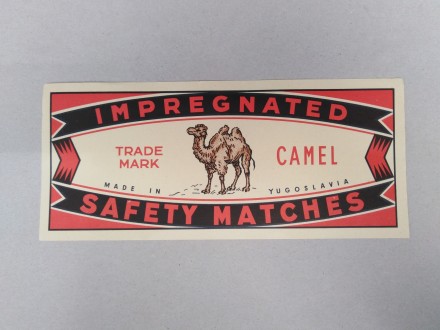Impregnated Safety Matches, Made in Yugoslavia, Retko !
| Cena: |
| Želi ovaj predmet: | 1 |
| Stanje: | Polovan bez oštećenja |
| Garancija: | Ne |
| Isporuka: | Pošta Post Express Lično preuzimanje |
| Plaćanje: | Tekući račun (pre slanja) Ostalo (pre slanja) Lično |
| Grad: |
Novi Sad, Novi Sad |
Detaljno stanje: Odlično
414
Stanje kao na fotografijama!
Trade Mark
Camel
Dimenzije:
30 x 13
Camel is an American brand of cigarettes, currently owned and manufactured by the R. J. Reynolds Tobacco Company in the United States and by Japan Tobacco outside the U.S.[1][2]
Most recently Camel cigarettes contain a blend of Turkish tobacco and Virginia tobacco. Winston-Salem, North Carolina, the city where R. J. Reynolds was founded, is nicknamed `Camel City` because of the brand`s popularity.
History
Two early Camel advertisements, (left): `The camels are coming!`, a piece of a series prior to the brand release in 1913. (right): 1915 ad from The New York Times, offering a money-back guarantee with the injunction, `Premiums or coupons don`t go with Camels, because the cost of the choice quality tobaccos makes it impossible for us to give them`
In 1913, Richard Joshua `R. J.` Reynolds, founder of the company that still bears his name, innovated the packaged cigarette.[4] Prior cigarette smokers had rolled their own, which tended to obscure the potential for a national market for a pre-packaged product.[4] Reynolds worked to develop a more appealing flavor, creating the Camel cigarette, which he so named because it used Turkish tobacco[4] in imitation of then-fashionable Egyptian cigarettes. Reynolds priced them below competitors,[specify] and within a year, he had sold 425 million packs.[4]
Camel cigarettes were originally blended to have a milder taste than established brands. They were advance-promoted by a careful advertising campaign that included `teasers` simply stating `the Camels are coming`,[4] a play on the old Scottish folk song `The Campbells Are Coming`. Another promotion was `Old Joe`, a circus camel driven through towns to attract attention and distribute free cigarettes. The brand`s slogan, used for decades, was `I`d walk a mile for a Camel!`[This quote needs a citation]
The iconic style of Camel is the original unfiltered cigarette sold in a soft pack, known as Camel Straights or Regulars. Its popularity peaked through the brand`s use by famous personalities such as news broadcaster Edward R. Murrow, whose usage of them was so heavy and so public that the smoking of a Camel no-filter became his trademark.[5]
In Europe, Camel is also a brand of cigarette rolling papers and loose cigarette tobacco, maintaining a top 20 roll-your-own rank in Northern Europe with yearly expansion into Southern and Eastern Europe according to the European Subsidiary`s annual report.
In 1999, Japan Tobacco International gained ownership of the rights to sell Camel outside the United States. The tobacco blend of the non-American Camel contains less Oriental tobacco and a higher proportion of Burley.
On July 1, 2000, an `Oriental` variety of Camel was introduced, followed by Turkish Gold, a regular cigarette, in 2000, and Turkish Jade, a menthol, in 2001. In 2005 Camel added its name on the cigarette paper and changed the filter color and design on its Oriental version, which was subsequently discontinued, but then reinstated. Also in 2005, Turkish Silvers were introduced, an ultralight version positioned in strength below Turkish Gold `lights` and `full flavor` Turkish Royal. Various Camel Crush and Camel Click cigarettes have also been created and are some of the most popular Camel variants being sold.[6]
In 2012, Camel was surpassed by Pall Mall as R. J. Reynolds` most popular brand.[7]
In June 2012, Camel Filters were discontinued in the United Kingdom.
In 2013, Camel celebrated its 100th anniversary. Professor Robert N. Proctor of Stanford University commented on the occasion with an editorial in the Los Angeles Times, noting that over the last century, Camel sold over 4 trillion cigarettes and `have probably caused about 4 million deaths.` In the same editorial, Proctor also stated that about half as many cigarettes are being sold to Americans in 2013 than in 1981.
☑ Zamolio bih clanove koji zele licno preuzimanje, da ne postavljaju uslove kako, sta, gde... licno preuzimanje je na mojoj adresi na Telepu, ako Vam to ne odgovara kupujte od nekog drugog.
☑ Svi predmeti su fotografisani na prirodnom svetlu, nema nikakvih filtera, efekata ili neceg slicnog !
❗❗❗ NE SALJEM U INOSTRANSTVO ❗❗❗
☑ Dobro pogledajte fotografije, da ne dodje do nekog nesporazuma!
☑ Tu sam za sva pitanja!
☑ Knjige saljem nakon uplate!
☑ POUZECEM SALJEM SAMO CLANOVIMA BEZ NEGATIVNIH OCENA!!!! Takodje ne saljem clanovima koji su novi tj. bez ocena!!!
☑ Filmski plakati:
☑ Molim Vas da ne ocekujete od plakata da izgledaju kao da su sada izasli iz stamparije, ipak neki od plakata imaju godina... i mi se nakon 50 godina zguzvamo :) Trudim se da ih sto bolje fotografisem kako bi ste imali uvid u stanje.
☑ Sto se tice cena plakata, uzmite samo u obzir da su ovo originalni plakati iz perioda filma, i da kada bi ste hteli da napravite (odstampate) bilo kakav filmski plakat sa intereneta kostalo bi Vas verovatno vise od hiljadu dinara...
☑ Antikvarne knjige:
☑ Sto se tice antikvarnih knjiga, molim Vas da ne ocekujete da knjige koje su stare neke i po 150 godina budu u savrsenom stanju, budite srecni sto su uopste pozivele toliko vremena i sto je informacija jos uvek u njima, a stanje kakvo je takvo je, uvek mogu da se odnesu da se prekorice i malo sreda, pa da opet dobiju malo svezine, naravno ko to zeli.
Predmet: 74841485









